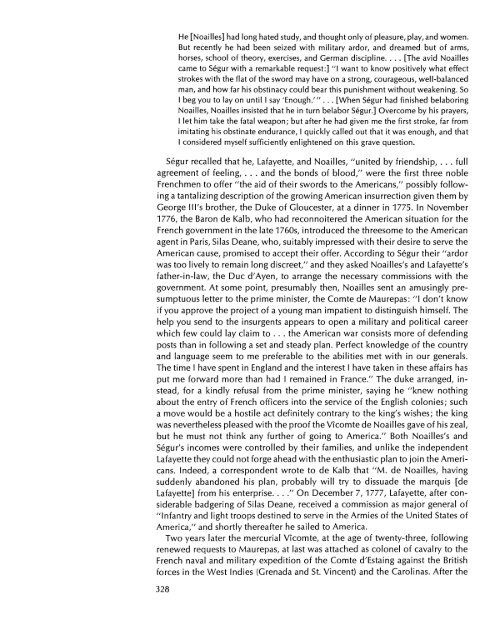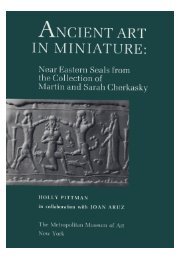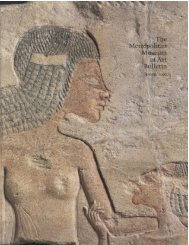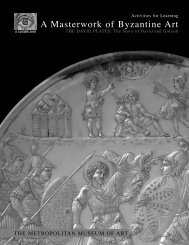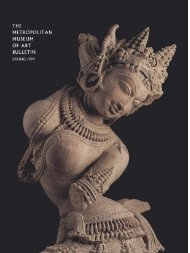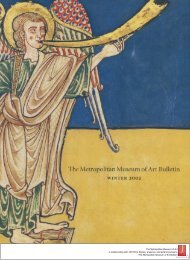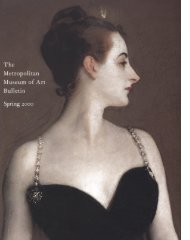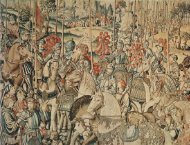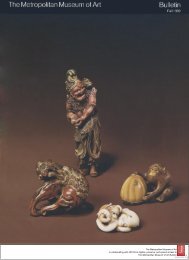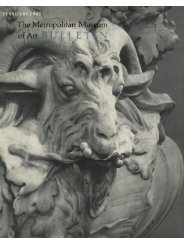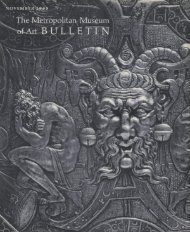The Metropolitan Museum of Art Bulletin, v. 29, no. 7 (March, 1971)
The Metropolitan Museum of Art Bulletin, v. 29, no. 7 (March, 1971)
The Metropolitan Museum of Art Bulletin, v. 29, no. 7 (March, 1971)
You also want an ePaper? Increase the reach of your titles
YUMPU automatically turns print PDFs into web optimized ePapers that Google loves.
He [Noailles] had long hated study, and thought only <strong>of</strong> pleasure, play, and women.<br />
But recently he had been seized with military ardor, and dreamed but <strong>of</strong> arms,<br />
horses, school <strong>of</strong> theory, exercises, and German discipline.... [<strong>The</strong> avid Noailles<br />
came to Segur with a remarkable request:] "I want to k<strong>no</strong>w positively what effect<br />
strokes with the flat <strong>of</strong> the sword may have on a strong, courageous, well-balanced<br />
man, and how far his obstinacy could bear this punishment without weakening. So<br />
I beg you to lay on until I say 'E<strong>no</strong>ugh.' "... [When Segur had finished belaboring<br />
Noailles, Noailles insisted that he in turn belabor Segur.] Overcome by his prayers,<br />
I let him take the fatal weapon; but after he had given me the first stroke, far from<br />
imitating his obstinate endurance, I quickly called out that it was e<strong>no</strong>ugh, and that<br />
I considered myself sufficiently enlightened on this grave question.<br />
Segur recalled that he, Lafayette, and Noailles, "united by friendship, . . . full<br />
agreement <strong>of</strong> feeling, . . . and the bonds <strong>of</strong> blood," were the first three <strong>no</strong>ble<br />
Frenchmen to <strong>of</strong>fer "the aid <strong>of</strong> their swords to the Americans," possibly following<br />
a tantalizing description <strong>of</strong> the growing American insurrection given them by<br />
George Ill's brother, the Duke <strong>of</strong> Gloucester, at a dinner in 1775. In November<br />
1776, the Baron de Kalb, who had recon<strong>no</strong>itered the American situation for the<br />
French government in the late 1760s, introduced the threesome to the American<br />
agent in Paris, Silas Deane, who, suitably impressed with their desire to serve the<br />
American cause, promised to accept their <strong>of</strong>fer. According to Segur their "ardor<br />
was too lively to remain long discreet," and they asked Noailles's and Lafayette's<br />
father-in-law, the Duc d'Ayen, to arrange the necessary commissions with the<br />
government. At some point, presumably then, Noailles sent an amusingly presumptuous<br />
letter to the prime minister, the Comte de Maurepas: "I don't k<strong>no</strong>w<br />
if you approve the project <strong>of</strong> a young man impatient to distinguish himself. <strong>The</strong><br />
help you send to the insurgents appears to open a military and political career<br />
which few could lay claim to ... the American war consists more <strong>of</strong> defending<br />
posts than in following a set and steady plan. Perfect k<strong>no</strong>wledge <strong>of</strong> the country<br />
and language seem to me preferable to the abilities met with in our generals.<br />
<strong>The</strong> time I have spent in England and the interest I have taken in these affairs has<br />
put me forward more than had I remained in France." <strong>The</strong> duke arranged, instead,<br />
for a kindly refusal from the prime minister, saying he "knew <strong>no</strong>thing<br />
about the entry <strong>of</strong> French <strong>of</strong>ficers into the service <strong>of</strong> the English colonies; such<br />
a move would be a hostile act definitely contrary to the king's wishes; the king<br />
was nevertheless pleased with the pro<strong>of</strong> the Vicomte de Noailles gave <strong>of</strong> his zeal,<br />
but he must <strong>no</strong>t think any further <strong>of</strong> going to America." Both Noailles's and<br />
Segur's incomes were controlled by their families, and unlike the independent<br />
Lafayette they could <strong>no</strong>t forge ahead with the enthusiastic plan to join the Americans.<br />
Indeed, a correspondent wrote to de Kalb that "M. de Noailles, having<br />
suddenly abandoned his plan, probably will try to dissuade the marquis [de<br />
Lafayette] from his enterprise. .. ." On December 7, 1777, Lafayette, after considerable<br />
badgering <strong>of</strong> Silas Deane, received a commission as major general <strong>of</strong><br />
"Infantry and light troops destined to serve in the Armies <strong>of</strong> the United States <strong>of</strong><br />
America," and shortly thereafter he sailed to America.<br />
Two years later the mercurial Vicomte, at the age <strong>of</strong> twenty-three, following<br />
renewed requests to Maurepas, at last was attached as colonel <strong>of</strong> cavalry to the<br />
French naval and military expedition <strong>of</strong> the Comte d'Estaing against the British<br />
forces in the West Indies (Grenada and St. Vincent) and the Carolinas. After the<br />
328


